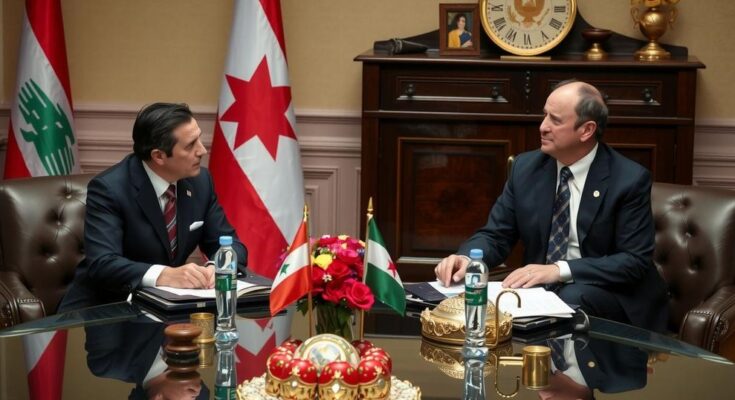Lebanon’s caretaker Prime Minister Najib Mikati is to meet Syria’s leader Ahmed al-Sharaa in Damascus, marking the first visit by a Lebanese premier in 15 years. This meeting reflects an opportunity for dialogue between the nations, historically burdened by Syrian influence and military presence in Lebanon. Mikati’s visit follows a significant political context linking their shared past and ongoing regional dynamics.
Lebanese caretaker Prime Minister Najib Mikati is set to meet with Syria’s de facto leader, Ahmed al-Sharaa, in Damascus on Saturday, marking the first visit of a Lebanese premier to Syria’s capital since Bashar al-Assad’s regime. This visit symbolizes a significant diplomatic gesture, as it is the first occasion in 15 years that a Lebanese leader has made such a trip amid complicated historical relations between the two nations.
President Joseph Aoun expressed optimism about utilizing this moment for “a serious and equal dialogue” with Syria, which had historically maintained considerable influence over Lebanon from the 1970s to the early 2000s, during which Syrian forces occupied Lebanon for 29 years until 2005.
Sharaa, who heads the Islamist-led forces that recently ousted Assad, assured political figures in Lebanon of Syria’s non-interference in their domestic affairs during recent discussions. Caretaker Foreign Minister Abdallah Bou Habib intends to accompany Mikati and has conveyed Lebanon’s eagerness for improved relations with its neighbor. The last visit by a Lebanese premier to Damascus occurred in 2010 by Saad al-Hariri.
The historical context of Lebanon-Syria relations is characterized by a complex web of political and military engagements, particularly during Lebanon’s civil war and Syria’s subsequent occupation. The assassination of former Lebanese Prime Minister Rafik al-Hariri in 2005 has marked a turning point in bilateral relations, prompting mass protests and significantly altering perceptions of Syrian involvement in Lebanese affairs.
In recent years, Hezbollah’s support for Assad during the Syrian civil war has further complicated these interactions. The connections between the two nations remain sensitive, as evidenced by ongoing scrutiny of past actions and the legacy of political struggle.
Mikati’s upcoming visit could, therefore, represent a pivotal opportunity to reshape a relationship fraught with historical grievances into a more constructive dialogue.
The historical backdrop of Lebanon-Syria relations dates back to the mid-20th century when both countries gained independence. For decades, Syrian influence in Lebanon was pronounced, especially during the Lebanese Civil War (1975-1990), where Syrian forces intervened and occupied Lebanon for 15 years. The assassination of Rafik al-Hariri in 2005 marked a crucial juncture, leading to widespread protests against Syrian control and eventual military withdrawal. This historical legacy has resulted in a complex relationship, characterized by both collaboration and tension.
In conclusion, Prime Minister Najib Mikati’s imminent visit to Syria signifies a potential thawing of relations between Lebanon and Syria, historically marked by conflict and mistrust. As regional dynamics shift, this meeting may pave the way for a renewed dialogue and improved bilateral relations, although lingering historical injustices and political complexities remain at play. The forthcoming discussions are a crucial step towards addressing longstanding issues between the two nations.
Original Source: www.newarab.com




